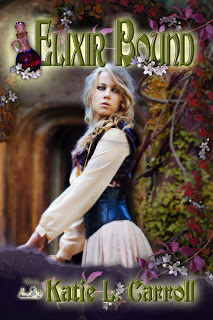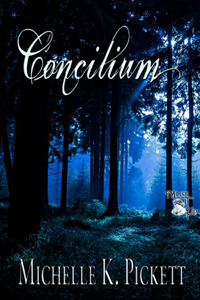Sue Perkins's Blog, page 20
September 10, 2012
Welcome Katie Carroll

Thanks for hosting me today, Sue! I’m a big fan of strong female characters in literature, particularly in my wheelhouse of YA, so I thought I’d share some thoughts about these strong women.
Over the years, I’ve read some awesome female leads. Tamora Pierce has given us numerous kick-ass young ladies, my favorites being Knight Alana and Provost Guard Beka Cooper. Kristin Cashore’s Graceling introduced killer, survivor, activist Kasta. Of course I would be remiss not to mention archer, hunter, tribute Katniss of Suzanne Collins’s The Hunger Games.
Katora Kase from my own Elixir Bound shares many of the same characteristics possessed by the esteemed ladies above: bravery, independence, stubbornness. These women make bold moves and often hide their emotions, unless that emotion is anger.
There’s a different kind of strong female character, though. One that often goes unnoticed. Her bravery is more subtle. She doesn’t necessarily hide her feelings from the world. Her strength is displayed in the way she treats others and the profound impact she has on their lives.
These are the Beth March’s of literature. No one could call Beth—who in Lousia May Alcott’s Little Women contracts scarlet fever and weakens in body until her death—physically strong. Beth’s strength is in her selflessness. It is while caring for a neighbor’s sick child, she falls ill herself. She faces the prospect of death with poise and does what she can for others even when bedridden. Prim, Katniss’s sister, is also one of these strong women (I won’t elaborate here because I don’t want to be a spoiler).
In Elixir Bound Katora’s sister Kylene is brave when she needs to be, but she is much more giving and open than Katora and mourns when she kills an animal for her own survival. When Katora must finally decide whether or not to become guardian of the Elixir, she wonders if it might actually require more strength of character to show one’s emotions and vulnerabilities or to hide them.
Although I consider myself more like the outwardly strong ladies of literature, I think it’s important to recognize different types of strengths. The unsung heroes of stories and life are often those who open their hearts to others and give of themselves. Since the day a little over a year ago I became a mother, I’m beginning to gain a firsthand understanding of this other strength in me.
Elixir Bound blurb:
Katora Kase is next in line to take over as guardian to a secret and powerful healing Elixir. Now she must journey into the wilds of Faway Forest to find the ingredient that gives the Elixir its potency. Even though she has her sister and brother, an old family friend, and the handsome son of a mapmaker as companions, she feels alone.
 For it is her decision alone whether or not to bind herself to the Elixir to serve and protect it until it chooses a new guardian. The forest hosts many dangers, including wicked beings who will stop at nothing to gain power, but the biggest danger Katora may face is whether or not to open up her heart to love.
For it is her decision alone whether or not to bind herself to the Elixir to serve and protect it until it chooses a new guardian. The forest hosts many dangers, including wicked beings who will stop at nothing to gain power, but the biggest danger Katora may face is whether or not to open up her heart to love.Elixir Bound is available at the MuseItUp Publishing bookstore, Amazon, and other e-book retailers.
About the author:
Katie L. Carroll began writing after her 16-year-old sister unexpectedly passed away. Writing was a way for Katie to help her sister live on in the pages of a story. It also made her realize that she wanted to pursue writing as a career. In addition to penning novels for teens and kids, she edits puzzle magazines, plays soccer, and collects signed copies of books. Katie lives in Connecticut with her husband and son. To learn more about Katie, to read her blog, or to contact her visit her website at www.katielcarroll.com.

Published on September 10, 2012 00:30
September 1, 2012
Lindsay Below and The Blackened Night
23 Days until the release of This Blackened Night, The Order: Book 3!

Every author has a set of characters more dear to their hearts than any others. In most cases, this stems from these characters being among the first ever created. I won't claim Lori and Terrence were my very first, but they did come close. Their first book, Stalking Shade, which released in 2011, was originally written in 2007. And rewritten. And rewritten.
And now it feels like a dear friend is moving away. With the release of This Blackened Night on September 24th, 2012, the trilogy will come to an end. Lori might be a prickly character, not easy for anyone but Terrence to love, but I had a lot of fun with her. When I wrote this third book late last year, I dragged my feet to see it finished for the same reason. I didn't want to let the pair of them go. A not-so-secret part of me is hoping for an overwhelming response from readers asking me to continue so I have an excuse to revisit my favorite characters.
For now, I'm counting down the days until the third book releases. Maybe you'll fall in love with Lori and Terrence every bit as fiercely as I have. Lori might be stubborn in pushing people away, but Terrence is the most persistent character I've ever written. Good thing, too.
Join me in celebrating the release of the third book a bit early with this short, sweet teaser excerpt:
This Blackened Night by L.K. Below
With murders cropping up all around, who should she trust?
After months of searching, Lori finally scrounges up a clue as to the whereabouts of the missing leader of her secret organization. But her vision isn't encouraging--it points to her vampire companion Terrence as the culprit.
Terrence is adamant that he isn't at fault. Even though she knows she might be walking into a trap, she follows his lead to a shabby island port. When her informants start turning up dead with puncture wounds in their necks, Lori wonders just how well she knows Terrence. And why does he act different during the search than in their hotel room?
Lori doesn't know who to trust anymore. She only hopes that she won't be the next victim.
Six Sweet Sentences from the book:
He leaned against the mouth of the alley. The light barely reached him there, only displaying part of his face. One fang winked in the darkness. His eyes seemed a darker color than usual, their expression more distant. Must be a trick of the light.
She couldn’t have pissed him off that much by following him, right?
Learn more about the series as a whole on the Lyrical Press, Inc. website: http://bit.ly/TheOrderSeries.
Read a longer excerpt from This Blackened Night at http://bit.ly/ThisBlackenedNight.
Bio: If L.K. Below gets far too attached to her characters, well, that's because they're interesting people. Read two of her favorites in her urban fantasy series, The Order. Join her online at www.lbelow.net to learn more. Want to keep up to date with her tour stops? Follow her on Twitter (http://twitter.com/LBelowtheauthor) or Facebook (http://www.facebook.com/pages/LK-BelowLindsay-Below/355586159614)


Published on September 01, 2012 00:30
August 21, 2012
A girl, a genie, a few demons. Would could go wrong?
Welcome Marva I think the title, log line and excerpt of this book are all enticing and make me want to read the book. Please tell us more about Setara's Genie.
SETARA’S GENIE
A girl, a genie, a few demons. Would could go wrong?
by Marva Dasef
MuseItUp Buy Link: http://tinyurl.com/SetarasGenie
Amazon Buy Link: coming soon
* * * Leave a comment with contact info to be in the draw for prizes * * *
Storytellers: Scheherazade and Abu Nuwas
Everyone knows about Scheherazade’s 1001 Arabian Nights. What you might not know is that the stories said to be originated by the King’s wife to keep her murderous husband from killing her are almost all derived from existing folklore and fairy tales.
The main folklore derivation is Scheherazade herself. The frame story of 1001 Arabian Nights is in itself a folk tale. Various stories were added or changed throughout the years. Modern western society likes the cleaned up Disney-style telling. Sir Richard Burton translated from the Persian in the 19th Century to produce a somewhat bawdier version of many stories. Sir Richard was a remarkable character himself, but I just couldn’t work him into the book. I recommend reading about him and also perusing his translations of various works (including the Kama Sutra). Wiki can provide additional details. http://en.wikipedia.org/wiki/Richard_Francis_Burton
 Was Scheherazade a real person? Yes and no. Like Robin Hood, this storytelling queen is a legend herself and may be based on a real person. However, it’s not known for sure. Wiki has a pretty good write up on her: http://en.wikipedia.org/wiki/Scheherazade
Was Scheherazade a real person? Yes and no. Like Robin Hood, this storytelling queen is a legend herself and may be based on a real person. However, it’s not known for sure. Wiki has a pretty good write up on her: http://en.wikipedia.org/wiki/Scheherazade Abu Nuwas, who I have used as my story teller, was a real writer/poet in the 8th Century. While my kindly story teller is a poor man who earns a meager living with his tales, the real Abu Nuwas was quite well off and considered to be Persia’s (Iran’s) most famous poet. His reputation wasn’t sterling, and he often found himself in legal trouble. Essentially, he just couldn’t keep his mouth shut sometimes. The Encyclopedia Britannica is a good source of information on the real, and much wilder, Abu Nuwas. http://www.britannica.com/EBchecked/topic/2288/Abu-Nuwas
A more detailed report is in Wiki, but is flagged as potentially unreliable. It does, however, jibe with other information I’ve read about Abu Nuwas. http://en.wikipedia.org/wiki/Abu_Nuwas
In researching Persian and Arabic lore, I was struck by the concept of the frame story. This is the style of 1001 Arabian Nights. The story of Scheherazade provides a framework for the folkloric tales. I had originally written Setara’s adventures as individual short stories. The first two were published as chapbooks by Sam’s Dot Publishing, then as I added another five tales, all the stories were included in a single collection titled “The Seven Adventures of Cadida.” Once the book’s contract expired, I decided to rewrite the stories and include the frame story to make the whole thing flow more as a novel than a series of short stories.
Eventually, the entire package ended up in the hands of MuseItUp Publishing and is presented now as “Setara’s Genie.”
Blurb:
Abu Nuwas sits in the bazaar on his threadbare rug; a cup and sign proclaim him a teller of tales. For one small coin, he bids passers by to listen. A poor girl, Najda, sells spices from a tray. Would he, she asks, trade a tale for a packet of spice? Abu Nuwas agrees and begins the epic adventures of a girl and her genie.
As did Scheherazade before him, Abu leaves Najda hanging in the middle of each yarn to keep her coming back. Between stories, he questions the girl about her life. He discovers that she’s been promised in marriage to an old man whom she hates, but she must wed him to save her sick mother’s life. The rich bridegroom will pay for the doctors the mother needs. Meanwhile, Najda sells spices in the market to earn enough money to keep her mother alive.
He relates the adventures of the bored daughter of a rich merchant, Setara, and her genie, Basit, as they encounter the creatures of legend and folklore: a lonely cave demon seeking a home; a flying, fire-breathing horse who has lost his mate; a dragon searching for his family; an evil genie hunting for the man who put him in a lamp; and a merboy prince cast out of his undersea kingdom.
Excerpt
 “Oh, goodness. Look at how low the sun sinks. I’m afraid we’ll have to continue tomorrow.”
“Oh, goodness. Look at how low the sun sinks. I’m afraid we’ll have to continue tomorrow.”Najda made a sad face. “I know how you are. You’re just like Scheherazade leaving the story hanging to keep the sultan from killing her.”
“I have met the lady. She was quite clever that way.”
Najda’s eyes grew wide. “You’ve met Scheherazade? That’s fantastic. Where is she? What is she doing now? Does the sultan still love her?”
Abu Nuwas patted the air with his hands. “Calmly, calmly. That was many years ago. She was old; I was young. But, yes, the sultan still loved her to the moment of her death. His heart broke, and he died within days himself.” He shook his head sadly. “A tragic tale in and of itself, yet the sultana left the world with so many delightful tales.”
“She certainly did. A thousand and one stories. Do you know that many, effendi?”
“Of course!” Abu Nuwas put his hand to his chest and bowed his head. “I know every story. Did you know that she did not make them all up?”
“No! Really! But—”
“It’s true.” He winked at Najda. “It was how she told them that made them so special. I still seek to be as good a teller of tales as she.”
“And in that tradition, you’ll tell me to go home now and come back tomorrow. Is that right?” Najda heaved a deep sigh. “I should have learned that by now.”
Abu Nuwas smiled. “You’re an adept learner, my child. Go home and take care of your mother. I’ll see you on the morrow.”
Najda stood. “Of course.” She walked away until she was hidden within the crowds bustling through the marketplace.
Abu Nuwas pushed his old bones to a stand. He had to bide his time with this tale and hope he would hear from his friend soon.
* * *
About Marva
Website: http://tinyurl.com/DasefAuthor
Book trailer: http://youtu.be/psQIC7vnCIU
MuseItUp Author Page: http://tinyurl.com/MIU-MarvaDasef
Blog: http://mgddasef.blogspot.com
Bio: Marva Dasef is a writer living in the Pacific Northwest with her husband and a fat white cat. Retired from thirty-five years in the software industry, she has now turned her energies to writing fiction and finds it a much more satisfying occupation. Marva has published more than forty stories in a number of on-line and print magazines, with several included in Best of anthologies. She has several already published books and the Witches of Galdorheim Series from her super duper publisher, MuseItUp.

Published on August 21, 2012 00:30
August 11, 2012
Welcome to Michelle Picket and Concilium

What is your favorite genre? Can you provide a link to a site where we can read some of your work or learn something about it?
This is a funny question for me. It really has two answers. My favorite genre to read, right now, is dystopian and/or thrillers. My favorite genre to write is urban fantasy and/or science fiction, but I don't read them. Well, very seldom do I read them.
You can read some of my work at my website: www.michelle-pickett.com there is a whole section dedicated to my writing. Also, www.conciliumbooks.com is dedicated just to the Concilium series.
What is your creative process like? What happens before sitting down to write?
Generally I make sure I have something to eat so my mind isn't wandering to what is lurking in the pantry. I fill my water bottle and put it on my desk with my cell phone. Then I grab my husband's hoodie. I have to have it to write. I don't know why or where the connection came from, but the hoodie is a must. Once I have his hoodie, my water and cell phone, I'm ready to sit down and start working.
What do you think are the basic ingredients of a story?
Well, there's the obvious one-plot. But I personally think that believable and likeable characters are, or should be, as well.
What voice do you find most to your liking: first person or third person?
I do almost all my writing from the first person point of view.
What is required for a character to be believable? How do you create yours?
A character must have flaws to be believable. People are flawed. It's a fact of life we can't get around. For a character to be believable as a "real" person, it, too, must be flawed. I create my characters with that main rule in mind. If I find I've created a perfect character, I go back to their character sketch and start over.
Deep down inside, who do you write for?
Oh, I don't have to look very deep to answer this question. I write for myself. There's no question about it.
Is writing a form of personal therapy? Are internal conflicts a creative force?
Yes, most definitely. Internal and external conflict does fuel my need to write. I'm not sure if they make me more or less creative, however. I do find that in times of high conflict I retreat into my writing more often—I crave that time of escape.
Do you believe you have already found "your voice" or is that something one is always searching for?
Yes, I believe I've found my voice at this point in my career. I don't think it is something we are always searching for as much as it is something that is always evolving.bb
What has been your experience with publishers?
I think I have a unique perspective on publishers. My first two manuscripts, Concilium and its sequel, are releasing through an e-publisher.
My debut young adult science/fiction romance, PODs, is releasing in paperback through a traditional publisher, Spencer Hill Press.
I've enjoyed working with both publishers. There are areas where they are vastly different in their practices, as I'm sure you can guess. And there are areas where they are very similar.
What I've found to be the most disturbing trend to me is the reaction people have to one over the other. When I mention I'm published with an e-publisher I sometimes get a less than stellar response, as if it isn't a "real" book being published. But when I mention one of my books will be released in paperback, eyes light up and people sit up and take notice. That bothers me. My first two books are just as "real" as my third—paper or no paper.
What are you working on now?
I'm currently editing Concilium: The Departure, the sequel to Concilium. It is scheduled to release in November. Everyone who has read it has said it is better than the first book.
I'm editing PODs, my YA novel. It is scheduled for release June 4th, 2013 – my son's 12th birthday.
I'm finishing up a science/fiction novel and I'm in the first stages of writing a YA urban fantasy.
I also have a YA paranormal romance on submission that is the first installment of a trilogy. As soon as it finds a home I'll begin editing the second and third installments of that series. I have them written, but they need some serious time in the editor's chair.
Is there anything you'd like to tell your readers?
Absolutely! First, thank you for choosing to spend your time reading my work. I'm honored.
Secondly, I'd love to hear from you! I love comments on my blog and emails in my inbox. Whether you have questions about my work, good things to say, constructive (that means nice) criticism, or even if you just want to say "Hi," I want to hear from you. Contact web details are set out below.
Michelle's Bio:
Michelle has been an avid reader since a young child. She began writing for personal enjoyment in college, where she graduated Summa Cum Laude with a degree in accounting. Deciding sitting in a cubical all day was her form of cruel and unusual punishment, she decided to do what she really wanted to—share her passion for reading and writing with others.
She wrote her debut novel Concilium in 2010. It was released July of 2012 by MuseItUp Publishing. The sequel, Concilium: The Departure will also be published by MuseItUp Publishing with scheduled release date of November 2012. Her Debut young adult novel, PODs, will be published by Spencer Hill Press and is scheduled for release in paperback June 4th, 2013.
Michelle was born and raised in Michigan. She now resides in a small community outside Houston, Texas with her incredibly supportive husband, four wonderful children, a 125-pound lap dog, a very grumpy cockatiel and a cat that thinks she's queen. Michelle writes adult and young adult Sci/Fi and urban fantasy romance.
Concilium Blurb

Leslee hit a strange animal with her car. Now she’s marked for death.
It was a simple car accident – the animal didn’t even die – but it drew the attention of the Cruor Imbibo. Driven by their insatiable need to feed, the secret society of Imbibo has devoured the dregs of civilization for centuries. Afraid Leslee will expose them, and put an end to their meal ticket, the Imbibo want her dead.
The Concilium is Leslee's only protection. Guardian of the ancient secret and the protector of humans, the Concilium fights to control the Imbibo and end their feeding frenzy. Miller works for the Concilium. Keeping Leslee alive is his next assignment.
Now Leslee is on the run, and the only thing between her flesh and the snapping jaws of the Imbibo is Miller. He and Leslee quickly form a bond, but will falling in love make Miller’s job more difficult? Because if he fails, Leslee will be next on the Imbibo menu.
The Cruor Imbibo are coming, and they're coming for Leslee.
Buy Links:
MuseItUp Publishing:
https://museituppublishing.com/bookstore2/index.php?page=shop.product_details&flypage=flypage.tpl&product_id=537&category_id=232&option=com_virtuemart&Itemid=1
Amazon:
http://www.amazon.com/Concilium-The-S...
Want your copy of Concilium signed? I'd be happy to do that! Just go to http://www.kindlegraph.com/ and send me a message and I'll send you a personalized inscription for your copy of Concilium.
I LOVE to hear from readers and other authors!
Links and Contact Information:
Website: www.Michelle-Pickett.com
Email: Michelle@Michelle-Pickett.com
Blog: www.Michelle-Pickett.com/blog
Facebook: www.Facebook.com/michellepickettauthor
Twitter: http://www.twitter.com/michelle_kp
Goodreads: http://goodreads.com/michelle-pickett
Trailer: http://youtu.be/dxLvVQ9s7u4
Linked In: http://www.linkedin.com/in/michellepi...
Book: htttp://www.conciliumbooks.com
PODs: http://www.site.spencerhillpress.com/...
Novel Excerpt:
Concilium is an Urban Fantasy with a big dose of romance and little touch of horror. But rather than tell you what the book is about, I'm going to give you a small glimpse at one of my favorite scenes. Leslee is for the first time realizing that she may not survive the obstacle facing her:
The rain made dusk fall earlier. I watched as the team grabbed their equipment. I knew they weren't as confident as they wanted me to believe. They expected a bad night.
“I want a gun.”
Miller looked at me and nodded. “It’s there in the hall. I want you to stay there. With the front windows covered and the bedroom doors closed, they won’t be able to see you. Stay on the floor. Here, put this in your pocket.” He handed me his car key. “If anything happens, Leslee, if any window breaks, if any of us tells you to go, get in the car and drive to the lake. Don’t think. Don’t ask questions. Just go. One of us will be there to get you as soon as it’s safe.”
“And if you aren't?” I asked.
“We will,” he said, his eyes intense. “We will,” he repeated emphatically.
“Okay.” I tried to manage a smile, tried to look as self-assured as he seemed. I couldn’t.
“Les, if you need to use the gun, shoot them in the neck. Right here where a man’s Adam’s apple is. Don’t waste a shot on the head or anywhere on the body. Just aim for the throat.”
“Okay. Why?”
“Their bodies aren’t built like ours. Their brains and spinal columns are in slightly different spots because of their, um, different look,” Brooks said, looking at Miller. “The throat is the kill shot. Like a shot to the back of the head would be for a human.”
“Okay, the throat,” I said, my voice wavering. My hands were already shaking. I prayed I could aim the gun if the time came. I hoped I’d be able to control my fear if I had to face one of the Imbibo alone.
One by one, the guys hugged me before they left, the same way they had every night at my house. Why did it feel so different? Why was I more worried than before? I didn’t have any answers, but the air felt ominous, the house felt threatening, and a thought slammed into me.
I could die here.
If you enjoyed the excerpt and would like to read more, Concilium is available through MuseItUp Publishing's bookstore or other online retailers.
Take an adventure…read a book today!
Blog Tour Give away:
Concilium E-Book
$10 Amazon Gift Card
a Rafflecopter giveaway

Published on August 11, 2012 00:30
August 4, 2012
A Writer's Life
The last few months have been hectic for me regarding my writing. There has been the lead up to the release of two books within a two week period. "The Sixth Key" released on 21st July and "Dragon Clans" the second of the Dragon series on 1st August. Both of these are enjoying blog tours with very kind blog hosts, visiting dates and links can be found on the right hand side of this blog.
Now I've started writing the third of the Dragon series, "Dragon Ice" which is due for release next April. Despite the impression a lot of non-writers have of authors, most of us still have to hold down a full time job, do all the usual household and mum type things, and squeeze in the time to write and promote our books.
Promotion often takes more time than writing and it's a very delicate balance between the two. At present I should be working on the manuscript but of course the Olympics are on, the sun is shining outside and I have a million and one other things to do, so I'm going to be good and pull my head in and put fingers on keyboard and bum on seat and get on with it.
Hope to see you all at the various blog tour visits. Leave a comment and be in to win an ebook of either book at the end of tour random pick from all who've left comments.

Now I've started writing the third of the Dragon series, "Dragon Ice" which is due for release next April. Despite the impression a lot of non-writers have of authors, most of us still have to hold down a full time job, do all the usual household and mum type things, and squeeze in the time to write and promote our books.
Promotion often takes more time than writing and it's a very delicate balance between the two. At present I should be working on the manuscript but of course the Olympics are on, the sun is shining outside and I have a million and one other things to do, so I'm going to be good and pull my head in and put fingers on keyboard and bum on seat and get on with it.
Hope to see you all at the various blog tour visits. Leave a comment and be in to win an ebook of either book at the end of tour random pick from all who've left comments.

Published on August 04, 2012 19:33
July 29, 2012
Fairytales can come true
Welcome Laurey, Tell us a little bit about yourself.
Thanks Sue. I'm 26-years-old and a reporter at the Newark Advertiser, Nottinghamshire, UK. This is my first novel which I have self-published. It is available on iBooks, Kindle, Kobo, Sony and a few other ebook stores.
Fairy tales seemed an appropriate theme for me to use in the novel, as fairy tales reflect universal themes of social class, love, money, appearance, the good, the bad, the ugly and everything in between - all resolved at the end with a happily ever after. I believe that every person on this planet seeks a happily ever after, whether they realise it or not or even if they don't really believe in them. One of the hardest parts though is realising when we have attained that happily-ever-after. What really defines it? What really makes us happy?
My story follows four women as they embark on that exact journey and face different trials and tribulations in their day-to-day lives to reach that ultimate goal....a fairytale ending.
What type of reading inspires you to write?
My inspiration to write comes from within – a simple desire to want to tell a story. However, if I’ve read a book that I was able to lose myself in, it only heightens my desire to get my own stories out into the public domain and give people a similar experience.
What do you think are the basic ingredients of a story?
A gripping beginning, an entertaining middle and an explosive ending – I also think the advice of ‘writing what you know’ also adds to the story you want to tell.
What voice do you find most to your liking: first person or third person?
There are certain voices for certain types of story and I adapt easily when I read all of them. However, I have found writing in the first person allows me to really get to grips with the character and understand what drives them as I effectively become that character.
What well known writers do you admire most?
All of them – purely for the fact they have been able to write a novel and get published. Something I dream of doing every day! It takes a lot of will power, determination, support, love and copious amounts of coffee to create 300+ pages of a believable world, full of dilemmas and resolutions. Anyone who has done that, whether I enjoyed the story or not, has my utmost respect.
What is required for a character to be believable? How do you create yours?
I think all characters can be believable in the right setting and with the right motive. However, I have made mine believable by giving them a little bit of me. As I said, write what you know!
Deep down inside, who do you write for?
I write for myself. After all, if I don’t like what I’ve written, no one else will.
Is writing a form of personal therapy? Are internal conflicts a creative force?
I personally love writing. I love being able to create a world in which I can control what happens. The only conflict I have is with the clock, as there are never enough hours in the day to get my day job done, and write as much as I want to.
Do you share rough drafts of your writings with someone whose opinion you trust?
I often talk my ideas through at people rather than to people. They sometimes join in and I secretly delight in the fact I have sucked them into my fictitious world. After all, that is a writer’s ultimate aim.
Do you believe you have already found "your voice" or is that something one is always searching for?
I have been told I have a particular style – sometimes the way I phrase things can be confusing to read, but it’s the way my brain works I’m afraid and it is something you get used to. I don’t try to write like anyone else, so in that respect I suppose I have found my voice.
What discipline do you impose on yourself regarding schedules, goals, etc.?
I am afraid I am naughty on this front and I write only when I feel inspired to do so (which luckily for me is a regular occurrence) otherwise I would probably write a load of rubbish that would be discarded the next day. However, I still write even if I don't know fully where the story is headed …sometimes perseverance has led me down a path I didn’t know was there and the best twists and turns have arrived in my plot.
As a reporter, I write every day anyway so sometimes I do find it hard to sit at my laptop when I get home - but the love I have for creative writing makes me settle comfortably into my chair and start typing.
What do you surround yourself with in your work area in order to help your concentrate?
I’m a minimalist girl really so coffee and my mobile? I like to know if anyone has text me or tried to get in touch. I also have music playing in the background, loud enough to sing along to but quiet enough so that my creative thoughts rise above it.
Do you write on a computer? Do you print frequently? Do you correct on paper?
I write on the laptop, print two to three chapters out at a time and then correct any mistakes as I go along. Once the novel is complete I print it off again and correct mistakes. I repeat once more for good luck.
What sites do you frequent on-line to share experiences or information?
Facebook mainly – although I’m on Twitter, I’m not a Tweeter – but that will change. I will change!
What are you working on now?
My second novel! I’m quite excited about it as the characters are only semi-formed and I can’t wait to flesh them out and meet them.
What do you recommend a new writer should do with all those things written years ago but never shown to anyone?
Have confidence in yourself and share them. Stories are meant to told - they are born to be shared.
How and why did you begin to be creative?
I have always been arty – I paint, I play the piano, I dance and I write. It’s a magical feeling being able to express yourself in colour, in movement or even create a whole world with words that will be interpreted so differently by the people who read them. I don’t think you begin to be creative, I think you either are or you are not.
Your mind is your work tool. How do you take care of it?
By giving it the right fuel. Eating right, plenty of exercise and being generally happy. That is how my mind works best.
Do you have a ritual like retiring to a lonely place from time to time to cleanse your mind?
Writing is a lonely exercise in itself – any more time alone and I would go crazy. I love my family and friends and like to be around them. They cleanse my mind for me – and often provide great material.
Have you ever had a job that was so stimulating that you could not get your mind off of it?
I am a reporter for a local paper – my first job since leaving University. Therefore, I often think about the stories I have written or heard that day – and while it is a rewarding job, I can easily leave behind the real world for a fictitious one.
"To give birth to ideas." Is this only an expression, or are there really parallels between giving birth and creativity?
I wouldn’t know personally. However, I would go as far to say that conceiving an idea is like sex for the mind….the spark of an idea can be quite orgasmic and you enjoy the moment of having thought of it in the first place. The idea then grows and develops inside of your mind until you have to get it down on paper – a painful and laborious process. But when the finished product finally arrives, you feel so proud that you were able to manage the feat of creating such a thing. You feel your product is the most beautiful thing in the world. Therefore, I think the whole writing process is like a pregnancy – if only an asexual one.
What do you feel when, after two or three years, you see an idea of yours again?
Critical
Thank you for this opportunity Sue.

Published on July 29, 2012 00:30
July 28, 2012
A Girl's Guide to Fairytales
Tomorrow Laurie Buckland visits my blog to tell us about her new book A Girl's Guide to Fairytales. I have recently read the book and decided to do a review prior to Ms Buckland's appearance.
Four very different women who are good friends. Maddy dreams of her own company, but is afraid to take the step into the unknown. Claire's future seems bleak. Her nature borders on the obsessive compulsive and prevents her meeting any potential boyfriends. Issie is an actress, following in her mother's footsteps but can she prevent her mother interfering? Sophie and boyfriend Tom have just moved in together and their life is full of happiness.
A Girl's Guide to Fairytales follows the lives of these four women as their future unfolds. They each have their own chapters as they support each other through thick and thin, encouraging and advising when needed. The story travels through happiness, sadness, anger and despair until I felt I knew each woman as a friend.
When I first started reading I wondered if this was going to be a 'Sex and the City' type of book. The only resemblance to the famous four is the main characters are women. Other than this there are no parallels. Ms Buckland has taken her characters from real life with all their problems, heartaches and happy times. It's not only the story that grabbed me, it's the quality of the writing. I would recommend A Girl's Guide to Fairytales to any reader of light romance. A very good read even if you don't usually read Chic Lit.

Four very different women who are good friends. Maddy dreams of her own company, but is afraid to take the step into the unknown. Claire's future seems bleak. Her nature borders on the obsessive compulsive and prevents her meeting any potential boyfriends. Issie is an actress, following in her mother's footsteps but can she prevent her mother interfering? Sophie and boyfriend Tom have just moved in together and their life is full of happiness.
A Girl's Guide to Fairytales follows the lives of these four women as their future unfolds. They each have their own chapters as they support each other through thick and thin, encouraging and advising when needed. The story travels through happiness, sadness, anger and despair until I felt I knew each woman as a friend.
When I first started reading I wondered if this was going to be a 'Sex and the City' type of book. The only resemblance to the famous four is the main characters are women. Other than this there are no parallels. Ms Buckland has taken her characters from real life with all their problems, heartaches and happy times. It's not only the story that grabbed me, it's the quality of the writing. I would recommend A Girl's Guide to Fairytales to any reader of light romance. A very good read even if you don't usually read Chic Lit.

Published on July 28, 2012 00:30
July 23, 2012
Margaret Mahy
Sad news today that the wonderful New Zealand children's author Margaret Mahy has passed away. I met Margaret several times and she was an untiring supporter of New Zealand authors, literature and in particular children's novels.
A wonderful person who will be greatly missed by New Zealand and all the writing community here and abroad.

A wonderful person who will be greatly missed by New Zealand and all the writing community here and abroad.

Published on July 23, 2012 03:57
July 21, 2012
New Release!
I'm delighted to say my fantasy alternate world novel 'The Sixth Key' is now available from Desert Breeze Publishing.
This is a review by Lynette Endicott
"I picked up The Sixth Key by Sue Perkins and could not put my eReader down! In the tradition of great fantasy or speculative fiction writers Perkins has created a new world, complete with history and traditions that Riley has to decipher if the man she loves is to fulfill his destiny. This is a sweet to warm romance that includes sexual tension to just the right degree. The adventure is heart-pounding, the puzzles challenging and the characters are not all human or humanoid. Perkins has included animals, from our world and mythology which always makes a book even more interesting for me. Pick up The Sixth Key today. You will be glad you did."
Lynette Endicott, author of More Than A Job.
If you look to the right hand side of the page you will see the links to the blogs I'm visiting on my blog tour. Visit these blogs and leave a comment to be the random draw in to win an ebook of 'The Sixth Key' at the end of the blog tour.

This is a review by Lynette Endicott
"I picked up The Sixth Key by Sue Perkins and could not put my eReader down! In the tradition of great fantasy or speculative fiction writers Perkins has created a new world, complete with history and traditions that Riley has to decipher if the man she loves is to fulfill his destiny. This is a sweet to warm romance that includes sexual tension to just the right degree. The adventure is heart-pounding, the puzzles challenging and the characters are not all human or humanoid. Perkins has included animals, from our world and mythology which always makes a book even more interesting for me. Pick up The Sixth Key today. You will be glad you did."
Lynette Endicott, author of More Than A Job.
If you look to the right hand side of the page you will see the links to the blogs I'm visiting on my blog tour. Visit these blogs and leave a comment to be the random draw in to win an ebook of 'The Sixth Key' at the end of the blog tour.

Published on July 21, 2012 03:01
July 17, 2012
Blog Tour for The Sixth Key
 My new novel "The Sixth Key" will be released on the 21st July and over the next few weeks I'll be travelling on a blog tour to talk about this book. I start on Lynette Endicott's blog and would love for you to visit. At the end of the blog tour there will be a random draw of all commenters for an ebook of "The Sixth Key" so be in to win.
My new novel "The Sixth Key" will be released on the 21st July and over the next few weeks I'll be travelling on a blog tour to talk about this book. I start on Lynette Endicott's blog and would love for you to visit. At the end of the blog tour there will be a random draw of all commenters for an ebook of "The Sixth Key" so be in to win.On the right you will see the dates and blogs I will be visiting. See you there.

Published on July 17, 2012 02:55























